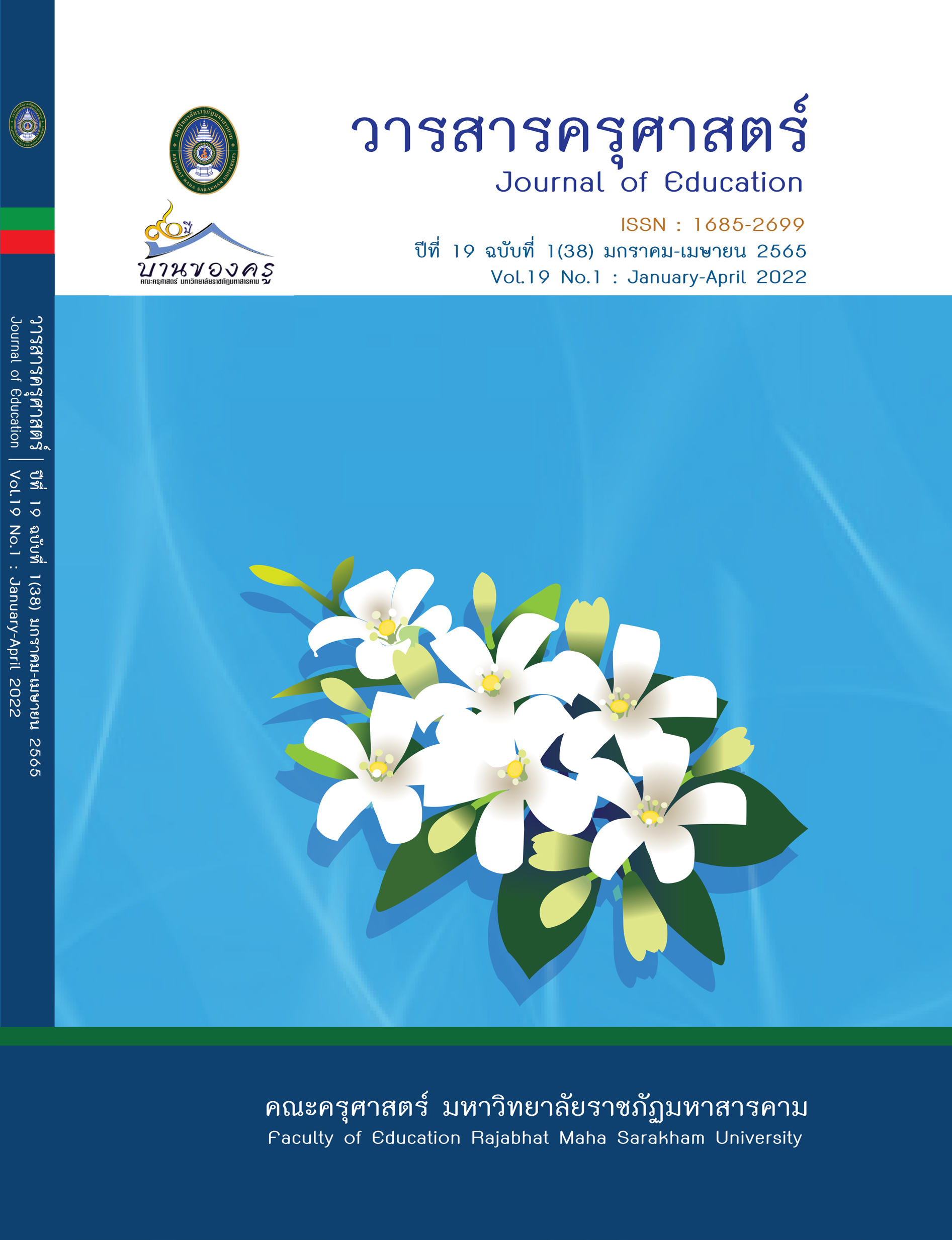Self-Coaching Program for Self-Esteem in Students of Faculty of Education, Rajabhat Maha Sarakham University
Main Article Content
Abstract
The objectives of this research were to 1) create a life coaching program for students' self-esteem and 2) to study the effect of the life coaching program for students' self-esteem. The research was divided into 2 phases: Phase 1, created a life coaching program for students' self-esteem. The program was evaluated by 5 experts from purposive sampling. Phase 2, studied the effect of the life coaching program for self-esteem among students. The target group was 15 students from the Faculty of Education in the second semester of Academic Year 2020, who voluntarily participated in the development program. The data collection tools were the self-esteem assessment form and the satisfaction assessment form.
The results showed that;
- The life coaching program for students’ self-esteem consisted of 5 components: 1) Principle, 2) Objective, 3) Content, 4) Development Activities and 5) Measurement and Evaluation. There were 6 modules: Module 1 Fundamentals of Mind, Module 2 Self-Awareness, Module 3 Self-Analysis, Module 4 Setting Goals in Life, Module 5 Life Actions for Self Transformation and Module 6 Life Coaching. These were indicated at high appropriateness level.
- The results of using the life coaching program for students’ self-esteem from the comparing of before and after the program implementation found that after the program, the students had higher self-esteem than before the program and the student satisfaction with the self-esteem life coaching program in overall was at the highest level.
Article Details

This work is licensed under a Creative Commons Attribution-NonCommercial-NoDerivatives 4.0 International License.
ข้อกำหนดเบื้องต้นที่ผู้นิพนธ์(ผู้ส่งบทความ) ควรทราบ
1. ผู้นิพนธ์ที่ประสงค์จะลงตีพิมพ์บทความกับวารสาร ตั้งแต่เดือนมกราคม 2563 เป็นต้นไป ให้ใช้รูปแบบใหม่ (Template 2563) โดยสามารถดูตัวอย่างได้ที่เมนู GUIDELINES
2. จะตีพิมพ์และเผยแพร่ได้ ต้องผ่านการประเมินจากผู้ทรงคุณวุฒิ (Peer Review)
3. การประเมินบทความโดยผู้ทรงคุณวุฒิ (Peer Review) เป็นแบบ Double Blind
4. การอ้างอิงบทความใช้หลักเกณฑ์ APA (American Psychological Association) คลิก
5. บทความถูกปฏิเสธการตีพิมพ์ ไม่ผ่านการประเมิน ผู้นิพนธ์ขอยกเลิกเองหรือชำระเงินก่อนได้รับการอนุมัติ ทางวารสารไม่มีนโยบายการคืนเงิน
References
ประดิษฐ์ มีสุขและทรงธรรม ธีระกุล. (2551). งานทักษิณวิชาการ’51 “มหาวิทยาลัยทักษิณกับทางแก้วิกฤตของชาติ” มหาวิทยาลัยทักษิณ วิทยาเขตสงขลา. ระหว่างวันที่ 16 – 19 สิงหาคม 2551 หน้า 119 – 143 : 119-143
ธนารัฐ มีสวย และคณะ. (2553). การศึกษาการเห็นคุณค่าแท้ในตนเองของนักศึกษามหาวิทยาลัย เทคโนโลยีราชมงคล : กรณีศึกษาวิทยาลัยการแพทย์แผนไทย มหาวิทยาลัยเทคโนโลยีราชมงคลธัญบุรี. วารสารพฤติกรรมศาสตร์เพื่อการพัฒนา ปีที่ 2 ฉบับที่ 1 มกราคม.
ธเนตร ตัญญูวงษ์. (2554). ผลของกิจกรรมนัทนาการเพื่อเสริมสร้างการเห็นคุณค่าในตนเองของเด็กกำพร้าที่รับผลกระทบจากเอดส์ บ้านแกร์ต้า จังหวัดลพบุรี. ปริญญานิพนธ์ วท.ม. (การจัดการนันทนาการ) กรุงเทพฯ : บัณฑิตวิทยาลัย มหาวิทยาลัยศรีนครินทรวิโรฒ.
ธัญชนก จิงาและศรีแพร เข็มวิชัย. (2563). ผลของโปรแกรมการเสริมสร้างความเข้มแข็งทางใจต่อการเห็นคุณค่าในตนเองและความคิดฆ่าตัวตายในผู้ที่พยายามฆ่าตัวตาย. วารสารสถาบันจิตเวชศาสตร์สมเด็จเจ้าพระยา. ปีที่ 14 ฉบับที่ 1.
แผนยุทธศาสตร์มหาวิทยาลัยราชภัฏมหาสารคาม ระยะ 20 ปี พ.ศ. 2560-2579). 2561. มหาสารคาม : มหาวิทยาลัยราชภัฏมหาสารคาม.
พิมพ์มาศ ตาปัญญา. (2556). การรู้สึกเห็นคุณค่าในตนเอง (Self Esteem). เชียงใหม่ : มหาวิทยาลัยเชียงใหม่.
อุดมวิทย์ วันกุมภา. เอกสารประกอบการสัมมนาแกนนำนักศึกษาเครือข่ายฯเรื่องการพัฒนาวินัยนักศึกษาอย่างไรให้เหมาะสมกับนักศึกษา. 23 ธันวาคม 2551.
อุรสา พรหมทาและจำเนียร พลหาญ. (2563). การพัฒนาการเห็นคุณค่าตนเอง(Self-Esteem) ของนักศึกษาคณะครุศาสตร์มหาวิทยาลัยราชภัฏมหาสารคาม. วารสารงานประชุมวิชาการเสนอผลงานวิจัยบัณฑิตศึกษา ระดับชาติ ครั้งที่ 4 . มหาสารคาม : .
Branden , Nayhaniel. The six Pillars of Self-Esteem. New York : Bantam Books.
Coopersmith, S. (1981a). SEI: Self Esteem Inventories. (2nd ed.). California:Consulting Psychologist.
John Bradshaw. (1996). The Family: A New Way of Creating Solid Self-Esteem. FL: Health communications
Mahatthanadull, Sanu. (2021). “การโค้ชชีวิต: มุมมองของจิตบำบัดและการให้คำปรึกษาเชิงพุทธ”. วารสารธรรมธารา 7 (1):135-70.
Samuel A.Cypert. (1993). The Power of Self-Esteem (Worksmart Series). OH, U.S.A ;AMACOM


